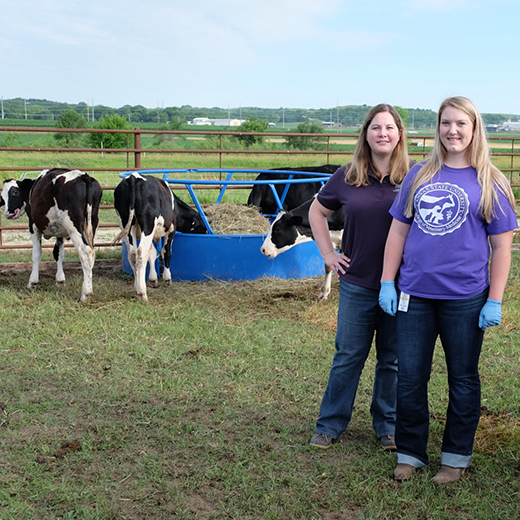Veterinary student conducts anaplasmosis research with national fellowship
Monday, Aug. 24, 2020

Kansas State University's Kathryn Reif, left, assistant professor of diagnostic medicine and pathobiology, and Lauren Herd, second-year veterinary medicine student. | Download this photo.
MANHATTAN — Kansas State University's Lauren Herd, a second-year veterinary student, Wichita, is one of 12 students selected nationally for a Veterinary Student Research Fellowship to Address Global Challenges in Food and Agriculture.
The Foundation for Food and Agriculture Research, in partnership with the Association of American Veterinary Medical Colleges, launched the Veterinary Fellows Program in 2019 to encourage veterinary scientists to explore and better understand the complexities of animal production, improve animal welfare and enhance human health. The three-month fellowship creates opportunities for veterinary students to pursue research related to global food security and sustainable animal production.
Herd's research project focuses on anaplasmosis, considered the most prevalent tick-transmitted disease in cattle worldwide, and a disease that affects almost 50% of Kansas beef cattle herds. Herd's research mentor is Kathryn Reif, assistant professor of diagnostic medicine and pathobiology in the College of Veterinary Medicine.
"Cattle that survive initial infection with Anaplasma marginale, the bacterial pathogen that causes anaplasmosis, become chronic carriers of the pathogen and can serve as future transmission reservoirs," Reif said. "Chlortetracycline is the only FDA-approved antimicrobial indicated for the control of active anaplasmosis in carrier cattle."
Reif said clinical anaplasmosis can reoccur in carrier animals if they become immunocompromised and their immune system isn't able to keep the pathogen under control. Cattle often experience transient periods of immunosuppression in a normal production season during estrus, calving, harsh weather conditions, or concurrent infections.
For her project, Herd assessed whether chlortetracycline protects transiently immunosuppressed calves from developing clinical anaplasmosis. Reif said the results of Herd's research could impact the way producers manage this disease and will provide data related to the efficacy of the current legal dose.
Herd and Reif were paired up by K-State's Veterinary Research Scholars Program, a summer program that provides veterinary students with in-depth, hands-on research opportunities with experienced faculty mentors. The program's goal is to motivate students toward a research-focused career.
"We are so proud of the impactful research that Lauren and Dr. Reif were able to accomplish this summer and so grateful to the Foundation for Food and Agricultural Research and Association of American Veterinary Medical Colleges for their support of Lauren and other fellows in their pursuit of important agricultural research," said Kate KuKanich, the college's Veterinary Research Scholars Program director.
"I am excited to be a part of this project because anaplasmosis has such a large economic impact on the US cattle industry," Herd said. "Tetracycline antimicrobials, including chlortetracycline, are commonly used in cattle production. If chlortetracycline is not effectively controlling anaplasmosis at the current legal dose, it would need to be re-evaluated. It is important to assist producers in making the best economical decision for their herds, as well as maintaining the efficacy of these medically important antimicrobials by ensuring they are used judiciously."
Anaplasmosis conservatively costs the U.S. cattle industry $300 million annually, Reif said.
"Use of chlortetracycline-medicated feed products is one of the most common ways producers control anaplasmosis in their herds; however, data from our lab demonstrates that there are many strains of Anaplasma marginale circulating in Kansas and not all strains may be equally susceptible to chlortetracycline," Reif said.
"To be most effective, use of chlortetracycline should protect carrier animals from redeveloping clinical disease during times of transient immunosuppression," Reif said. "Lauren's project will directly evaluate this using two different A. marginale strains: one a historic strain isolated over 30 years ago, and a second strain isolated from a Kansas beef cattle herd two years ago and that is still actively infecting cattle. We are excited to be doing research that contributes needed information to support U.S., and especially Kansas, cattle producers."
